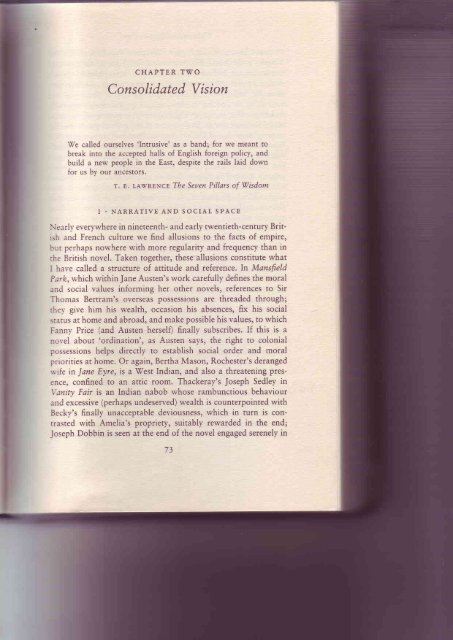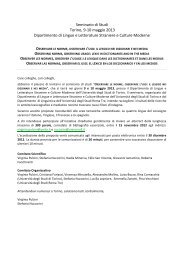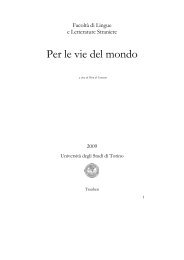Consolidated Vision
Consolidated Vision
Consolidated Vision
Create successful ePaper yourself
Turn your PDF publications into a flip-book with our unique Google optimized e-Paper software.
CHAPTER TWO<br />
<strong>Consolidated</strong> <strong>Vision</strong><br />
We called ourselves<br />
'Intrusive'<br />
as a band; for we meant to<br />
break into the accepted halls of English foreign policy, and<br />
build a new people in the East, despite the rails laid down<br />
for us by our ancestors.<br />
r. E. LA'wRENcs The Seuen Pillars of Wisdom<br />
I NARRATIVE AND SOCIAL SPACE<br />
\early everywhere in nineteenth- and early twentieth-century Britrsh<br />
and French culture we find allusions to the facts of empire,<br />
bur perhaps nowhere with more regularity and frequency than in<br />
rhe British novel. Taken together, these allusions constitute what<br />
I have called a structure of attitude and reference. In Mansfield<br />
Par,t, which within Jane Austen's work carefully defines the moral<br />
and social values informing her other novels, references to Sir<br />
Thomas Bertram's overseas possessions are threaded through;<br />
rhev give him his wealth, occasion his absences, 6x his social<br />
srarus at home and abroad, and make possible his values, to which<br />
Fanny Price (and Austen herself) finally subscribes. If this is a<br />
novel about 'ordination', as Austen says, the right to colonial<br />
possessions helps directly to establish social order and moral<br />
priorities at home. Or again, Bertha Mason, Rochester's deranged<br />
n'ife in lane Eyre, is a 'S7est<br />
Indian, and also a threatening presence,<br />
confined to an attic room. Thackeray's Joseph Sedley in<br />
Yanity Fair is an Indian nabob whose rambunctious behaviour<br />
and excessive (perhaps undeserved) wealth is counterpointed with<br />
Becky's finally unacceptable deviousness, which in turn is contrasted<br />
with Amelia's propriety, suitably rewarded in the end;<br />
Joseph Dobbin is seen at the end of the novel engaged serenely in<br />
/)
Culture and lmPerialism<br />
wriring a history of the Punjab. The good ship Rose in charles<br />
Kingsl-ey's westward Hol wanders through the caribbean and<br />
South America. In Dickens's Great Expectations, Abel Magwitch<br />
is the convict transported to Australia whose wealth-conveniently<br />
removed from Pip's triumphs as a provincial lad<br />
flourishing in London in the guise of a gentleman-ironically<br />
makes possible the great expectations Pip entertains. In<br />
_-"ty<br />
other óickens novels businessmen have connections with the<br />
empire, Dombey and Quilp being rwo noteworthy examples' For<br />
Disraeli's Tancred and Eliot's Daniel Deronda, the East is partly<br />
a habitat for native peoples (or immigrant European populations),<br />
a crucial setting.<br />
The situation in France was different, in so far as the French<br />
France suffered during the Revolution and the Napoleonic era<br />
meanr that its empire had a less secure identity and presence in<br />
French culture. In Chateaubriand and Lamartine one hears the<br />
finds in Britain.<br />
There is also a dense body of American writing, contemporary<br />
with this British and French work, which shows a peculiarly<br />
acute imperial cast, even though paradoxically its ferocious anticolonialism,<br />
directed at the Old Vorld, is central to it. One thinks,<br />
for example, of the Puritan 'errand into the wilderness' and,<br />
later, of that extraordinarily obsessive concern in Cooper, Twain,<br />
Melville, and others with United States expansion westward,<br />
74
erons **,ith the *n r,,l*"',ir!*:::::':^destruction or native<br />
.{merican life (as memorably studied by Richard slotkin, patricia<br />
l-rmerick, and Michael Paul Roginl); an imperial motif emerges<br />
to rir-al the European one. (ln chapter Four of this book I shall<br />
dcal u'irh other and more recenr aspecrs of the united States in<br />
ns lare nventieth-cenrury imperial form.)<br />
.\s a reference, as a point of definition, as an easily assumed<br />
place of rravel, wealth. and service, the empire functions for much<br />
of rhe European nineteenth century as a codified, if only marpnallv<br />
visible, presence in fiction, very much like the servants in<br />
grand households and in novels, whose work is taken for granted<br />
bur scarcely ever more than named, rarely studied (though Bruce<br />
Robbins has rgcently written on them2), or given density. To cite<br />
enorher intriguing analogue, imperial possessions are as usefully<br />
tl,ere. anonymous and collective, as the outcast populations (analr-sed<br />
bv Gareth Stedman Jones3) of transienr workers, part-time<br />
emplovees, seasonal artisans; their existence always counts,<br />
rhough rheir names and identities do noq they are profitable<br />
*'irhour being fully there. This is a literary equivalent, in Eric<br />
S'olf's somewhat self-congratulatory words, of .people without<br />
Hisron'',a people on whom the economy and poliry sustained by<br />
empire depend, but whose reality has not historically or culturally<br />
required attention.<br />
In all of these instances the facts of empire are associated with<br />
susrained possession, with far-flung and sometimes unknown<br />
spaces, with eccentric or unacceptable human beings, with forrune-enhancing<br />
or fantasized activities like emigration, moneymaking,<br />
and sexual adventure. Disgraced younger sons are sent<br />
off ro the colonies, shabby older relatives go there to rry to recoup<br />
losr fortunes (as in Balzac's La Cousine Bette), enterprising young<br />
rrar-ellers go there to sow wild oats and to collect exotica. The<br />
rhe African, Pacific, and Atlantic wilderness. But most of the-.i<br />
great nineteenth-century realistic novelists are less assertive about<br />
colonial rule and possessions than either Defoe or late writers like<br />
75
Cuhure and Imperialism<br />
Conrad and Kipling, during whose time great electoral reform<br />
and mass participation in politics meant that imperial competition<br />
became a more intrusive domestic topic. In the closing year of the<br />
nineteenth century, with the scramble for Africa, the consolidation<br />
of the French imperial Union, the American annexation of the<br />
Philippines, and British rule in the Indian subcontinent at its<br />
height, empire was a universal concern.<br />
What I should like to note is that these colonial and imperial<br />
realities are overlooked in criticism that has otherwise been extraordinarily<br />
thorough and resourceful in finding themes to discuss.<br />
The relatively few writers and critics who discuss the relationship<br />
befween culture and empire-among them Martin Green, Molly<br />
Mahood, John McClure, and in particular Patrick Brantlingerhave<br />
made excellent contributions, but their mode is essentially<br />
narrative and descriptive-pointing out the presence of themes,<br />
the importance of certain historical conjunctures, the influence<br />
or persistence of ideas about imperialism-and they cover huge<br />
amounts of material.s In almost all cases they write critically of<br />
imperialism, of that way of life that Iíilliam Appleman rùfilliams<br />
describes as being compatible with all sorts of other ideological<br />
persuasions, even antinomian ones, so that during the nineteenth<br />
century'imperial outreach made it necessary to develop an appropriate<br />
ideology' in alliance with military, economic, and political<br />
methods. These made it possible to 'preserve and extend the<br />
empire without wasting its psychic or cultural or economic substance'.<br />
There are hints in these scholars' work that, again to<br />
quote '!ùfilliams,<br />
imperialism produces troubling self-images, for<br />
example, that of 'a benevolent progressive policeman'.6<br />
But these critics are mainly descriptive and positivist writers<br />
strikingly different from the small handful of generally theoretical<br />
and ideological contributions-among them Jonah Raskin's TÉe<br />
Mythology of Imperialism, Gordon Lewis's Slauery, Imperialism<br />
and Freedom: Studies in English Radical Thought, and V. G.<br />
Kiernan's Marxism and Imperialism and his crucial work, The<br />
Lords of Human Kind.7 All these books, which owe a great<br />
deal to Marxist analysis and premises, point out the centrality of<br />
imperialist thought in modern Westerh culture.<br />
Yet none of them has been anywhere as influential as thev<br />
76
ebo u r d h a v e b e n,,, ., ::: : ^:: :lo o H,, g a t rh e c a no n i c a r<br />
rorks of nineteenth-<br />
":;::':<br />
and twentieth-century European culture. The<br />
Eetor critical practitioners simply ignore imperialism. In recently<br />
rtreading Lionel Trilling's fine licle book on E" M. Forster, for<br />
osrance. I was struck that in his otherwise perceptive considerenon<br />
of Howards End he does not once mention imperialism,<br />
rhrch. in my reading of rhe book, is hard to miss, much less<br />
fEnore. Afrer all, Henry'$Tilcox and his family are colonial rubber<br />
gro\\'ers:<br />
'They had the colonial spirit, and were always making<br />
for some spots where the white man might carry his burden<br />
unobserr-ed.'8 And Forster frequently contrasts and associates that<br />
fzcr *-irh rhe changes taking place in England, changes that affect<br />
lronard and Jacky Bast, rhe schlegels, and Howards End itself.<br />
Or rhere is the more surprising case of Raymond \Tilliams, whose<br />
Cvlntre and society does not deal with the imperial experience at<br />
all. \\hen in an inrerview williams was challenged about this<br />
massir-e absence, since imperialism 'was not something which<br />
s'as secondary and external-it was absolutely constitutive of the<br />
whole narure of the English political and social order . . . the<br />
ralienr facr'e-he replied that his \7elsh experience, which ought<br />
ro ha'e enabled him to think about the imperial experience, was<br />
'r'enmuch<br />
in abeyance' at the time he wrote Culture and<br />
Sorrefr'.10) The few tantalizing pages in The Country and the City<br />
rhar rouch on culture and imperialism are peripheral to the book's<br />
main idea.<br />
\\hv did these lapses occur? And how was the centraliry of<br />
rhe imperial vision registered and supported by the culture that<br />
produced it, then to some extent disguised it, and also was transformed<br />
by it? Naturully, if you yourself happen ro have a colonial<br />
background, the imperial theme is a determining one in your<br />
formarion, and it will draw you ro it if you aiso happen to be a<br />
dedicared critic of European literature. An Indian or African scholar<br />
of English literature reads Kim, say, or Heart of Darkness<br />
s'irh a critical urgency not felt in quite the- same way by an<br />
-{merican or British one. But in what way can we formulate the<br />
relationship between culture and imperialism beyond the asseverarions<br />
of personal testimony? The emergence of formerly colonial<br />
subjecrs as interpreters of imperialism and its great cultural works<br />
77
Cubure and Imperialism<br />
has given imperialism a perceptible, not to say obtrusive identity<br />
as a subiect for study and vigorous revision. But how can thar<br />
particular kind of post-imperial testimony and study, usually left<br />
at the margins of critical discourse, be brought into active conracr<br />
with current theoretical concerns?<br />
To regard imperial concerns as consritutively significant to the<br />
culture of the modern Vest is, I have suggested, to consider that<br />
culture from the perspective provided by anti-imperialist resistance<br />
as well as pro-imperialist apology. tùlhat does this mean?<br />
It means remembering that Western writers until the middle of<br />
the t'wentieth century, whether Dickens and Austen, Flaubert or<br />
Camus, wrote with an exclusively STestern audience in mind, even<br />
when they wrote of characters, places, or situations that referred<br />
to, made use of, overseas territories held by Europeans. But just<br />
because Austen referred to Antigua in Mansfield Park or ro realms<br />
visited by the British navy in Persuasion without any rhoughr of<br />
possible responses by the Caribbean or Indian narives resident<br />
there is no reason for us to do the same. ìùle now know that<br />
these non-European peoples did not accepr with indifference the<br />
authoriry proiected over them, or the general silence on which<br />
their presence in variously attenuated forms is predicated.<br />
'!7e<br />
must therefore read the great canonical texts, and perhaps also the<br />
entire archive of modern and pre-modern European and American<br />
culture, with an effort to draw out, extend, give emphasis and<br />
voice to what is silent or marginally present or ideologically represented<br />
(I have in mind Kipling's Indian characters) in such<br />
works.<br />
\ h practical terms, 'conrrapuntal reading' as I have called it<br />
i means reading a text with an understanding of what is involved<br />
i when an author shows, for instance, that a colonial sugar plantation<br />
is seen as important to the process of maintaining a particular<br />
style of life in England. Moreover, like all literary rexrs, these<br />
are not bounded by their formal hisioric beginnings and endings.<br />
References to Australia in Dauid Copperfield or India in lane Eyre<br />
are made because they can be, because British power (and not<br />
just the novelist's fancy) made passing references to these massive<br />
appropriations possible; but the further lessons are no less rrue:<br />
that these colonies were subsequenrly liberated from direct and<br />
z8
<strong>Consolidated</strong> <strong>Vision</strong><br />
rule, a process<br />
that began and unfolded while the British<br />
olonialism and its destruction of the Algerian srate, and the later<br />
rltttcnce of an independent Algeria (which Camus opposed).<br />
Each rexr has its own particular genius, as does each geographicrl<br />
rcgion of the world, with its own overlapping experienies and<br />
-rdependent histories of conflict. As far as the cultural work is<br />
@cerned, a distinction befween particulariry and sovereignty (or<br />
bmetic exclusiveness) can usefully be made. obviously no readi<br />
should rry ro generalize so much as to efface the identity of<br />
e parricular text, author, or movement. By the same token it<br />
Lrston', administrators, and apologists and, no less importanr, ro<br />
ùc India foughr for by Indian nationalists as their counrry to be<br />
ron back. By giving an account of this series of pressures and<br />
@unrer-pressures in Kipling's India, we understand the process<br />
oí rmperialism itself as the great work of art engages them, and<br />
of larer anti-imperialist resistance. In reading a text, one must<br />
open ir out both to what went into it and to what its author<br />
crcluded. Each cultural work is a vision of a moment, and we<br />
musr juxrapose that vision with the various revisions it later<br />
provoked-in this case, the nationalist experiences of postrndependence<br />
India.<br />
In addition, one must connect the structures of a narrative to<br />
79
Culture and Imperialism<br />
into overt military or political resistance. The novel contributed<br />
significantly to these feelings, attitudes, and references and became<br />
a main element in the consolidated vision, or departmental cultural<br />
view, of the globe.<br />
I should specify how the novelistic contribution was made and<br />
also, conversely, how the novel neither deterred nor inhibited the<br />
more aggressive and popular imperialist feelings manifest after<br />
r88o.22 Novels are pictures of reality at the very early or the very<br />
late stage in the reader's experience of them: in fact they elaborate<br />
and maintain a reality they inherit from other novels, which they<br />
rearticulate and repopulate according to their creator's situation,<br />
gifts, predilections. Platt rightly stresses conseruation in the<br />
'departmental<br />
view'; this is significant for the novelist, too: the<br />
nineteenth-century English novels stress the continuing existence<br />
(as opposed to revolutionary overturning) of England. Moreover,<br />
they neuer advocate giving up colonies, but take the long-range<br />
view that since they fall within the orbit of British dominance,<br />
that dominance is a sort of norm, and thus conserved along with<br />
the colonies.<br />
What we have is a slowly built up picture with Englandsocially,<br />
politically, morally charted and differentiated in<br />
immensely fine detail-at the centre and a series of overseas territories<br />
connected to it at the peripheries. The continuity of British<br />
imperial policy throughout the nineteenth century-in fact, a nar<br />
rative-is actively accompanied by this novelistic process, whose<br />
main purpose is not to raise more questions, not to disturb or<br />
otherwise preoccupy attenticn, but to keep the empire more or<br />
less in place. Hardly ever is the novelist interested in doing a great<br />
deal more than mentioning or referring to India, for example, in<br />
Vanity Fair and lane Eyre, or Australia in Great Expectations.<br />
The idea is that (following the general principles of free trade)<br />
outlying territories are available for use, at will, at the novelist's<br />
discretion, usually for relatively simple purposes such as immigration,<br />
fortune, or exile. At the end of Hard Times, for example,<br />
Tom is shipped off to.the colonies. Not until well after midcentury<br />
did the empire become a principal subject of attention in<br />
writers like Haggard, Kipling, Doyle, Conrad as well as in emerging<br />
discourses in ethnography, colonial administration, theory<br />
88<br />
rq
<strong>Consolidated</strong> <strong>Vision</strong><br />
cconomy, the historiography of non-European regions, and<br />
idized subjects like Orientalism, exoticism, and mass psy-<br />
Thc actual interpretative consequences of this slow and steady<br />
of attitude and reference articuiated by the novel are<br />
. I shall specify four. The first is that, in literary history,<br />
unusual organic continuity can be seen between the earlier<br />
rrarives that are normally not considered to have much to do<br />
-t empire and the later ones expliciúy about it. Kipling and<br />
Gúrad are prepared for by Austen and Thackeray, Defoe, Scotr,<br />
rd Dickens; they are also interestingly connecred with their con-<br />
F 'pnraries like Hardy and James, regularly supposed to be only<br />
oincidenrally associated with the overseas exhibits presented by<br />
Òcir rarher more peculiar novelistic counrerparts. But both the<br />
brmal characteristics and the contents of all these novelists'works<br />
Ldong ro rhe same cuhural formation, the differences being rhose<br />
o{ rnflection, emphasis, stress.<br />
Second, the strucrure of attitude and reference raises the whole<br />
grsrion of power. Today's critic cannot and should not suddenly<br />
3n'e a novel legislative or direct political aurhoriry: we musr<br />
oonrlnue ro remember that novels participate in, are part of,<br />
conrribute ro an exrremely slow, infinitesimal politics that clarifies,<br />
rtrnforces, perhaps even occasionally advances perceptions and<br />
emrudes about England and the world. It is striking that never,<br />
h rhe novel, is that world beyond seen except as subordinare<br />
end dominated, the English presence viewed as regulative and<br />
rcrmarive. Part of the extraordinary novelty of Aziz's triai in A<br />
Pass.zge to India is that Forster admits that 'the flimsy framework<br />
of rhe court'23 cannot be sustained because it is a 'fantasy'<br />
that<br />
compromises British power (real) with impartial justice for Indians<br />
unreal). Therefore he readily (even with a sort of frusrated<br />
rmparience) dissolves the scene into India's 'complexity', which<br />
nrenn'-four years before in Kipling's Kim was jusr as present. The<br />
main difference berween the rwo is that the impinging disturbance<br />
oi resisring natives had been thrust on Forster's awareness. Forster<br />
could not ignore somerhing that Kipling easily incorporared (as<br />
s'hen he rendered even rhe famous'Mutiny'of 1857 as mere<br />
s'ar-rvardness, not as a serious Indian objection to British rule).<br />
89





